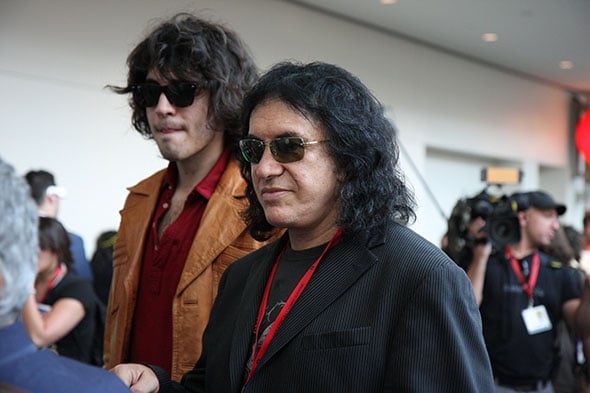Rock Is Dead: Gene Simmons Claims Piracy And ‘The Kids’ Killed Rock And Roll
In a new interview with Esquire, legendary rocker Gene Simmons claims that the music industry isn't dying - it's been dead for quite some time. As the interview was conducted by Gene's 25-year-old son Nick, it seems inevitable that file-sharing would be brought into the discussion, and it was. But despite that, this isn't a simple matter of an old crank complaining about the younger generation - he does make some great points.
When asked about what advice he'd give starting musicians, Simmons replied, "Don't quit your day job is a good piece of advice. When I was coming up, it was not an insurmountable mountain. Once you had a record company on your side, they would fund you, and that also meant when you toured they would give you tour support." This is a great contrast to today, where scoring a record label deal is incredibly difficult - you truly have to be something special, or at least get noticed by the right set of eyeballs.

Gene and Nick Simmons - Credit: Nathan Rupert (Flickr)
He continues, "I am so sad that the next 15-year-old kid in a garage someplace in Saint Paul, that plugs into his Marshall and wants to turn it up to ten, will not have anywhere near the same opportunity that I did. He will most likely, no matter what he does, fail miserably. There is no industry for that anymore. And who is the culprit? There's always the changing tide of interests — music taste changes with each generation. To blame that is silly. That was always the exciting part, after all: "What's next?" But there's something else. The death of rock was not a natural death. Rock did not die of old age. It was murdered."
I'm not a musician, but I do love music - and I have to disagree with Gene here. It seems Simmon's definition of "rock and roll" requires a fat paycheck. It doesn't take much searching at all to find non-mainstream bands that play their hearts out, and fall into most definitions of rock and roll.
"And the real culprit is that kid's 15-year-old next-door neighbor, probably a friend of his. Maybe even one of the bandmates he's jamming with. The tragedy is that they seem to have no idea that they just killed their own opportunity — they killed the artists they would have loved. Some brilliance, somewhere, was going to be expressed, and now it won't, because it's that much harder to earn a living playing and writing songs. No one will pay you to do it."
In terms of making it truly big - on the same level of Kiss, The Rolling Stones, and the Beatles - I think few would argue that it's harder than ever to accomplish it. There are huge bands out there, but not on the same level of those, and those that do make it huge don't usually have the staying power. After all, bands like Kiss are still playing shows today, some forty years later. What current-generation bands are potentially likely to have such staying power? I can't think of one.

Current Bands Can Kiss Their Potential Goodbye, Says Gene Simmons - Credit: Anirudh Koul (Flickr)
"The masses do not recognize file-sharing and downloading as stealing because there's a copy left behind for you — it's not that copy that's the problem, it's the other one that someone received but didn't pay for. The problem is that nobody will pay you for the 10,000 hours you put in to create what you created. I can only imagine the frustration of all that work, and having no one value it enough to pay you for it."
File-sharing has made a major impact on the music industry - there's absolutely no denying that. But I'd argue that the bigger reason why there are no "big" bands anymore is because the Internet has given us unparalleled accessibility to music. Before the Internet, people relied mostly on the television to tell them what music should be popular. Today, you can hop on Spotify and be instantly introduced to hundreds of bands that fall into your preferred genres. Naturally, a person can only spread themselves so thin, so while someone might want to attend a show by every band they like, it's a pipe dream for most.
The definition of "rock and roll" is sure to differ from person to person; Gene Simmons seems to put huge weight on both the size of shows played and the money earned, whereas I don't really think either have anything to do with it. There are still many current bands that I love, and I constantly discover more. What is unfortunate is that smaller bands have such a difficult time making a living off of what they're doing. Canadian female metal band Kittie recently had to take a hiatus because of that very reason, something that really drove that point home for me. It's a very weird thing to see a rocker selling homes, but it highlights the problem perfectly.

